
CHEMISTRY AND TECHNOLOGY OF FUELS AND OILS
Scope & Guideline
Pioneering Research in Fuels and Oils for Sustainable Progress
Introduction
Aims and Scopes
- Fuel Chemistry and Processing:
Research dedicated to the chemical properties, reactions, and processes involved in the production and refinement of various fuels, including conventional and renewable sources. - Oil Reservoir Characterization and Management:
Studies that explore the geological, physical, and chemical characteristics of oil reservoirs to enhance extraction techniques and optimize resource management. - Catalysis and Reaction Engineering:
Innovations in catalytic processes and reaction engineering aimed at improving efficiency and sustainability in fuel production and oil refining. - Environmental Impact and Sustainability:
Research that examines the environmental consequences of fuel and oil production, alongside strategies for reducing carbon footprints and enhancing eco-friendliness. - Advanced Materials and Nanotechnology:
Explorations of new materials and nanotechnology applications in the enhancement of oil recovery, fuel efficiency, and pollution reduction. - Modeling and Simulation in Energy Systems:
Application of computational modeling and simulation techniques to predict and analyze behaviors in fuel and oil systems for improved operational efficiency.
Trending and Emerging
- Enhanced Oil Recovery (EOR) Technologies:
There is an increasing focus on EOR techniques, particularly those involving nanotechnology and advanced materials, aimed at maximizing resource extraction from existing reservoirs. - Sustainable and Renewable Energy Sources:
Research on integrating renewable energy sources and biofuels into traditional fuel systems is gaining traction, reflecting a global push towards sustainability. - Carbon Capture and Storage (CCS) Technologies:
The exploration of CCS technologies is on the rise, as efforts to mitigate climate change intensify, leading to innovative approaches to reduce CO2 emissions in fuel production. - Digital Technologies in Oil and Gas:
The application of digital technologies, including machine learning and big data analytics, is becoming prominent for optimizing production processes and enhancing operational efficiency. - Environmental Remediation and Pollution Control:
Research focused on environmentally friendly technologies for pollution control and remediation in petroleum operations is emerging as a significant area of interest.
Declining or Waning
- Traditional Oil Recovery Techniques:
There is a noticeable reduction in research focused solely on conventional oil recovery methods, as the industry shifts towards enhanced oil recovery (EOR) technologies and unconventional resources. - Basic Hydrocarbon Chemistry:
Papers that cover fundamental aspects of hydrocarbon chemistry have become less frequent, with a growing emphasis on applied research and technology development. - Low-Temperature Fuel Technologies:
Research addressing low-temperature fuel technologies has waned as focus shifts towards high-efficiency processes and alternative energy solutions. - Petroleum By-Products Utilization:
The exploration of petroleum by-products has seen a decline, as the journal pivots towards more innovative applications and sustainable alternatives.
Similar Journals

Solid Fuel Chemistry
Illuminating the Path to Cleaner Energy SolutionsSolid Fuel Chemistry is a pivotal journal published by PLEIADES PUBLISHING INC, dedicated to advancing knowledge in the fields of chemical engineering, chemistry, and fuel technology. With its ISSN 0361-5219 and E-ISSN 1934-8029, this esteemed publication has been contributing to the scientific community since its inception, covering extensive research from 1975 to 2024. Operating within the Q3 and Q4 quartiles, it holds a significant position among peers in its categories, ranked 94th in Energy & Fuel Technology and 212th in General Chemical Engineering. Although it lacks an open access option, the journal remains a vital resource for researchers, professionals, and students eager to explore innovative developments in solid fuels and their applications. The articles published in Solid Fuel Chemistry provide essential insights, facilitate collaboration, and inspire further research, making it an indispensable platform for anyone engaged in this essential field of study.
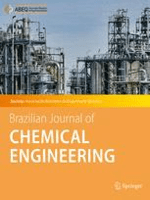
BRAZILIAN JOURNAL OF CHEMICAL ENGINEERING
Pioneering Research for Tomorrow's ChallengesThe Brazilian Journal of Chemical Engineering (ISSN: 0104-6632, E-ISSN: 1678-4383), published by Springer Heidelberg, stands as a prominent open-access journal dedicated to disseminating innovative research and advancements in chemical engineering since its inception in 1997. With a commitment to enhancing knowledge exchange within the field, this journal is indexed in Scopus, earning a respectable Q3 rank in the category of General Chemical Engineering as of 2023. It provides a platform for researchers, professionals, and students to explore a diverse range of topics, fostering collaboration and innovation from its base in Brazil. The journal has converged its operations from 1995 and will continue to push the boundaries of chemical engineering research until 2024 and beyond. As a critical resource for up-to-date methodologies and emerging trends, the Brazilian Journal of Chemical Engineering is essential for those aiming to make impactful contributions in this dynamic and evolving field.
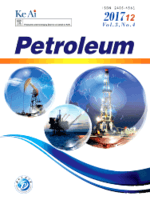
Petroleum
Advancing sustainable energy solutions through cutting-edge research.Petroleum, an esteemed open-access journal published by KEAI PUBLISHING LTD, serves as a premier platform for disseminating high-quality research in the fields of energy engineering, fuel technology, geology, and related earth sciences. Established in 2015, the journal exemplifies innovation and scholarly rigor with a commendable ranking in the second quartile across multiple categories, including Energy Engineering and Geopolitics. With a focus on advancing knowledge and practices in the petroleum sector, it encourages submissions that encompass a broad spectrum of topics from exploration and extraction techniques to environmental impacts and sustainability measures. Based in Beijing, China, this journal's impact is further enhanced by its significant presence in the Scopus database, achieving impressive percentiles, such as the 95th for Geology and 93rd for Geochemistry and Petrology. The open-access model fosters unrestricted global collaboration and accessibility, making the latest research available to a diverse audience of researchers, professionals, and students eager to innovate and lead in the burgeoning energy landscape.
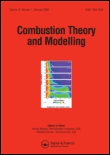
COMBUSTION THEORY AND MODELLING
Charting New Territories in Combustion ScienceCombustion Theory and Modelling is a pivotal journal for researchers and professionals in the fields of chemical engineering, energy technology, and combustion science. Published by Taylor & Francis Ltd, this journal, with an ISSN of 1364-7830 and E-ISSN 1741-3559, provides a platform for disseminating significant advances in our understanding of combustion processes and their applications. With a solid impact factor, as reflected in its Q2 ranking across multiple categories including Chemical Engineering, Energy Engineering, and Modeling and Simulation, it serves not only to enhance theoretical knowledge but also to bridge the gap between theory and practical applications. The journal spans a wide timeline from 1997 to 2024, ensuring that it covers both foundational studies and cutting-edge research. Situated in the UK, the journal actively invites submissions that contribute to the evolving landscape of combustion science, making it an essential resource for academics, industry professionals, and students keen on exploring the dynamics of energy and fuel technologies.

Journal of Combustion
Transforming Insights into Combustion BreakthroughsJournal of Combustion is a premier academic journal dedicated to the field of combustion science and technology, published by HINDAWI LTD. With an ISSN of 2090-1968 and an E-ISSN of 2090-1976, the journal has been an open-access platform since 2008, ensuring that cutting-edge research is accessible to all. Based in the United States at Adam House, 3rd Flr, 1 Fitzroy Sq, London W1T 5HF, England, the journal publishes articles spanning various relevant disciplines, contributing to knowledge in Chemical Engineering, Fuel Technology, and Energy Engineering. As of 2023, it ranks in the Q3 quartile in Chemical Engineering (miscellaneous) and Fuel Technology, and in Q4 in Condensed Matter Physics and Energy Engineering and Power Technology, highlighting its growing impact and relevance in these fields. Researchers will find valuable insights as the journal converges its findings from 2010 to 2024. With a focus on promoting innovative approaches and exploring new frontiers in combustion research, the Journal of Combustion continues to be an essential resource for academics, professionals, and students committed to advancing the understanding and application of combustion processes.

China Petroleum Processing & Petrochemical Technology
Pioneering insights for a sustainable energy landscape.China Petroleum Processing & Petrochemical Technology is a critical journal published by the China Petroleum Processing & Petrochemical Technology Press, focusing on the pivotal advancements within the field of petroleum processing and petrochemical technology. With ISSN 1008-6234, the journal has been a significant resource since its inception in 1999 and aims to disseminate original research articles, reviews, and case studies that contribute to knowledge and innovation in energy engineering, fuel technology, and chemical engineering. Despite its current Q4 status in various quartile rankings, it provides essential insights and research that are invaluable for researchers, professionals, and students interested in these expanding areas. The journal is located in Beijing, China, and continues to strive for excellence in academia, encouraging contributions that address pressing challenges in the petroleum and petrochemical industries while fostering a deeper understanding of process chemistry and technology.
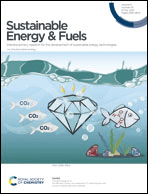
Sustainable Energy & Fuels
Shaping Tomorrow's Energy Landscape TodaySustainable Energy & Fuels is a leading journal published by the Royal Society of Chemistry, dedicated to advancing knowledge in the fields of energy engineering, fuel technology, and renewable energy solutions. With its ISSN of 2398-4902 and notable Q1 status in both Energy Engineering and Power Technology as well as Fuel Technology, this journal ranks impressively in the Scopus database, ensuring a strong platform for disseminating impactful research. The journal spans a comprehensive scope aimed at addressing the global challenges of sustainable energy, including innovative methodologies and technologies that promote environmental sustainability. Although it operates under a traditional access model, the journal is committed to providing high-quality content that engages researchers, professionals, and students alike. With significant contributions expected through 2024, Sustainable Energy & Fuels stands at the forefront of facilitating scholarly communication, inspiring advancements in energy technologies that align with sustainability goals.
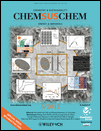
ChemSusChem
Connecting Chemistry with Sustainability for Global ImpactChemSusChem is a premier interdisciplinary journal, published by WILEY-V C H VERLAG GMBH, that focuses on the critical fields of Chemical Engineering, Energy, Environmental Chemistry, and Materials Science. Since its inception in 2008, the journal has consistently maintained a Q1 ranking across multiple categories, highlighting its role as a vital resource for researchers and professionals dedicated to advancing sustainable chemical processes and technologies. With an impressive impact factor, it ranks 12th in General Chemical Engineering and is highly regarded within its scopes, indicating the journal's commitment to publishing high-quality, innovative research that addresses global challenges in energy and environmental sustainability. Though it operates on a subscription model, its contributions are essential for those in academia and industry seeking cutting-edge developments in sustainable chemistry. As it approaches its convergence span through 2024, ChemSusChem continues to shape the future of sustainable chemistry, making it a must-read for students, researchers, and practitioners alike.
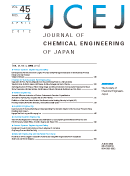
JOURNAL OF CHEMICAL ENGINEERING OF JAPAN
Connecting Researchers to Transform Chemical EngineeringJOURNAL OF CHEMICAL ENGINEERING OF JAPAN is a distinguished academic publication in the field of chemical engineering and chemistry, published by Taylor & Francis Ltd. With its ISSN 0021-9592 and E-ISSN 1881-1299, this journal has been a vital resource for researchers and practitioners since its inception in 1968 and continues to provide essential insights and advancements through 2024. The journal operates under an Open Access model as of 2023, promoting wider dissemination of research findings and encouraging collaboration within the global scientific community. Currently categorized in the Q4 quartile for both Chemical Engineering and Chemistry (miscellaneous) in 2023, it ranks within the lower percentiles of its respective fields, offering a platform for emerging scholars to publish their work and gain visibility. As part of Japan's academic landscape, it addresses numerous aspects of chemical engineering, fostering innovation and technical development that contribute to the industry's growth. Engaging with this journal is paramount for those looking to stay informed on the latest research trends and applications in chemical processes.
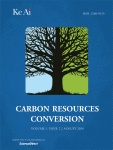
Carbon Resources Conversion
Pioneering Sustainable Innovations in Carbon UtilizationCarbon Resources Conversion is a prominent interdisciplinary journal that focuses on the innovative aspects of carbon resource utilization, aiming to advance research and applications in catalysis, fuel technology, and materials science. Published by KEAI PUBLISHING LTD, this Open Access journal, established in 2018, has rapidly developed a reputation for its high-quality research, evident from its impressive quartile rankings in 2023, including Q2 in Catalysis and Q1 in both Fuel Technology and Materials Science (miscellaneous). With its dedicated editorial board and rigorous peer-review process, Carbon Resources Conversion serves as an essential platform for researchers, professionals, and students striving to address contemporary challenges in energy and materials sustainability. The journal's strong Scopus rankings reaffirm its influence and accessibility within the scientific community, making it a vital resource for advancing the knowledge and application of carbon resource conversion processes.